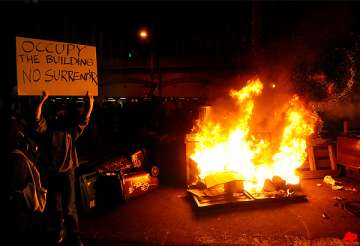Occupy Protesters Disavow Oakland Violence
Oakland, California, Nov 4: Occupy Wall Street protesters had just half a day to celebrate what they saw as their biggest victory so far, a daylong gathering in California that drew thousands of people and
Oakland, California, Nov 4: Occupy Wall Street protesters had just half a day to celebrate what they saw as their biggest victory so far, a daylong gathering in California that drew thousands of people and led to the peaceful shutdown of the United States' fifth-busiest port. Then, after midnight, the vandalism began.
After a small group of what city leaders called “provocateurs” clashed with riot police, set fires and shattered windows in Oakland early Thursday, demonstrators across the country condemned the violence and wondered whether it would destroy their cause.
“They don't speak for the majority of people who were here yesterday,” said Hadas Alterman, a college student who was gathering trash at a tent camp near Oakland City Hall.
The 3,000-person protest outside the port Wednesday night was an escalation in tactics as the demonstrators against economic inequality targeted a major symbol of the nation's commerce with peaceful rallies and sit-ins. Maritime operations there were effectively shut down for the night.
But bands of masked protesters, some with shields, then took over a vacant building, set bonfires, erected roadblocks and threw chunks of concrete and firebombs. Five people and several officers were injured. Police in riot gear arrested at least 103 people.
The clash raised questions about whether a movement with no organizational structure and no high-profile leaders can stop them. The movement's tent camps in public parks have drawn all types of people, including the homeless, families and anarchists.
On Thursday afternoon, representatives from the Occupy Oakland media committee read a statement saying participants supported the goal of reclaiming empty buildings to serve the public but regretted that their daylong downtown demonstration was marred by an “autonomous” group.
“Occupy Oakland does not advocate violence and has no interest in supporting actions that endanger the community and possibilities that it has worked to build,” Laura Long said, reading the statement.
Few cities have reached the level of Oakland, which has a long history of tensions between residents and police. Tempers rose when a clash between protesters and police left an Iraq War veteran injured.
Across the country at the Occupy Boston camp, Bob Norkus said the riots didn't represent the broader movement and likely wouldn't have a lasting effect. The movement is still evolving and mistakes are inevitable, he said.
It “has to be nonviolent, or else it will just end. We won't get the support,” he said. “It doesn't mean you can't agitate people. But you can't also be breaking windows and burning.”
Chris Hedges, who was demonstrating at Goldman Sachs' headquarters in New York, said the clashes in Oakland are a reminder to protesters that they should only respond peacefully to police actions.
“It's awful. But police want people to break windows and set cars on fire, because it's the kind of thing they know how to master—with force,” he said, before being led quietly away in handcuffs.
Some protesters said violence can bring attention to the cause.
“This thing has to escalate so people see the violence and who is protecting the interests of the corporations,” said Denver protester Dwayne Hudson, standing next to a grill with logs burning over charcoal to stay warm after a snowstorm.
The far-flung movement challenging the world's economic systems and distribution of wealth has gained momentum in recent weeks, with Oakland becoming a rallying point after the Iraq War veteran was injured.
A protest organizer in Chicago, Joshua Kaunert, said the Oakland shutdown was an “amazing” event for the movement, but he didn't want to speculate on what effect the violence would have. He said the lack of a formal leadership structure—and the emphasis on what he called a “true, direct democracy”—makes it difficult to weed out potential troublemakers.
“As a movement, it is definitely hard to keep that kind of element away, but that's a double-edged sword,” Kaunert said.
Brenda Jamison, a mother of four who lives downtown, watched the Oakland clash from her window and prayed for it to stop. She said the police acted appropriately when they tried to separate the disruptive protesters from the peaceful masses.
“I don't feel like I'm home,” she said. “It's not an issue of black and white. You just have these people who come out looking for an excuse to tear up everything. It's not right.”
